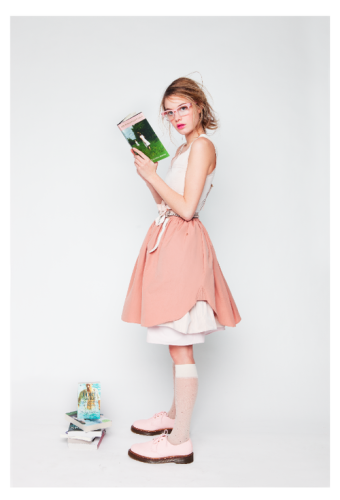 ETA: This post has been updated at 2pm PST to reflect new information regarding the veracity of The Publisher’s Weekly piece.
ETA: This post has been updated at 2pm PST to reflect new information regarding the veracity of The Publisher’s Weekly piece.
Once upon a time I lived in New York City and worked at a literary agency where I read a lot of query letters and manuscript submissions. Most of them sucked. We even made a Query Letter Drinking Game to quantify and celebrate the myriad of ways in which a manuscript was capable of sucking.
Consequently, there were lots of reasons to reject a proposal or request a complete overhaul. But “too gay” was never one of them.
So, I was surprised to read in Publisher’s Weekly about two YA novelists (Rachel Manija Brown and Sherwood Smith) who’d been told by a prospective agent that s/he’d take on their manuscript “on the condition that we make the gay character straight, or else remove his viewpoint and all references to his sexual orientation.”
Brown and Smith were, unsurprisingly, unimpressed with the offer:
Rachel replied, “Making a gay character straight is a line in the sand which I will not cross. That is a moral issue. I work with teenagers, and some of them are gay. They never get to read fantasy novels where people like them are the heroes, and that’s not right.”
The agent suggested that perhaps, if the book was very popular and sequels were demanded, Yuki could be revealed to be gay in later books, when readers were already invested in the series.
We knew this was a pie-in-the-sky offer—who knew if there would even be sequels?—and didn’t solve the moral issue. When you refuse to allow major characters in YA novels to be gay, you are telling gay teenagers that they are so utterly horrible that people like them can’t even be allowed to exist in fiction.
The authors go on to say that this was not an isolated incident, that other agents had similar reactions.
Any gay person working in media or entertainment might wonder what all the fuss is about — the fact that People With Money don’t think they can sell Our Gay Art is simply a fundamental truth of the creative industries we work in. Your lesbian screenplay remains far more likely to find support on Kickstarter than at The William Morris Agency and gay actors are still told that remaining closeted is necessary to advance their career. As a freelance writer, I got a taste of the journalism industry’s inherent fear of queer content and as CEO of a lesbian website, I’ve ingested an all-you-can eat Old Country Buffet of that ish.
But we expect more from books, don’t we? Due to a number of factors including low overhead, books have always been where minority groups have a voice — they may be hard to find, but they’re out there. Movies need millions of viewers to earn out, books can get by on mere tens of thousands.
Furthermore, Young Adult fiction, generally defined as fiction written for or marketed towards kids between the ages of 12 and 20, is notorious for pushing the boundaries of social acceptability and tackling controversial issues like cutting, drug abuse, incest, teen pregnancy and, of course, homosexuality.
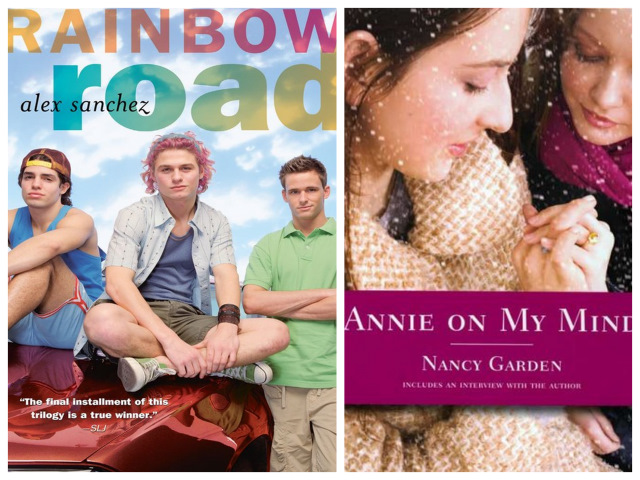
In 1982, young budding lesbians were treated to Nancy Garden‘s oft-censored legendary lesbian YA novel Annie on my Mind, which featured not only a physical and emotional lesbian relationship between two teenage girls, but also a happy ending. It took twenty more years for a primetime television series to feature its first lesbian high school character — Evan Rachel Wood as Jessie on Once and Again. Presently it’s remarkably easy to find a gay teenager on television — Degrassi, Glee, Pretty Little Liars, Skins, 90210 — but that’s a very very recent phenomenon. In fact, the legendary Chuck Bass was gay in the Gossip Girl books and from what I’ve heard of the show, that element of his character never made the full transition from page to stage.
Needless to say, Smith & Brown’s case seems out of step with visible industry trends and my own anecdotal experiences.
I talked to Foundry Media Literary Agent Stephen Barbara, who represents leading YA authors including Lauren Oliver and Lisa Graff, about the PW piece. He pointed out: “It is actually quite fascinating to see the YA world attacked as a stronghold of mainstream conformity when only recently, Megan Cox Gurdon in the Wall Street Journal famously (or infamously) decried YA novels as “So dark that kidnapping and pederasty and incest and brutal beatings are now just part of the run of things.”
Of course, there’s a difference between controversial material and diversity (although LGBT characters are lucky enough to come up in conversations about both) to which Barbara posits: “Are the same editors who publish such edgy material also systematically forcing their authors to make their characters white, straight, and non-disabled? It’s a good question, perhaps more asserted than proved, and it would be interesting if someone were to find an objective way to answer it.”
Pointing out that it’s difficult to draw conclusions from a piece that’s “anecdotal rather than statistics-based,” Barbara told me: “If there is systemic effort to make all YA “straight white,” we should see it reflected in the books published each year. Yet the same article at PW links to a page with a long list of major authors with LGBTQ characters and themes in their novels, and the comments section of the page is full of supportive stories from agents and writers who, encouragingly, have sold or are selling books which do not fit a ‘straight white mold.'”
Malinda Lo, award-winning YA novelist and co-founder of the Diversity in YA blog, didn’t have any trouble selling her lesbian YA novel, Ash, a lesbian take on the Cinderella story: “Commercial publishing in the United States is so gay-friendly it’s practically Gay Utopia. I mean, children’s book editors are, frankly, notoriously liberal! (Or else, open secret, they’re gay!) And they live and work in New York City, which is second only to San Francisco in Gay Utopicness.”
But to see how typical or atypical her experience was, Lo did some number-crunching after reading the Publisher’s Weekly post, and what she found wasn’t great or terrible.
Lo’s graph of the LGBT YA novels published every year from 1969 ’til 2011:
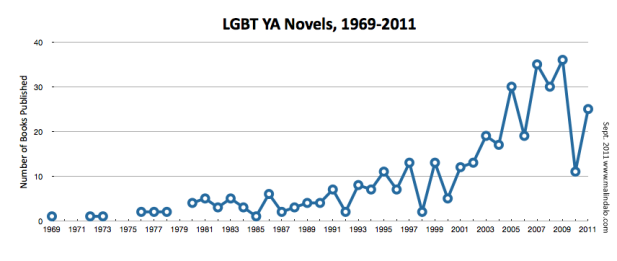
(Sidenote: Due to the two-year publishing cycle, the 2010 downturn is almost certainly a result of the 2008 economic crash)
However, Lo points out that relative to the entire YA market (and its ambiguous numbers), LGBT YA still accounts for less than 1% of the marketplace. To be fair, the percentage of Young Adults identifying as LGBT is probably not much higher.
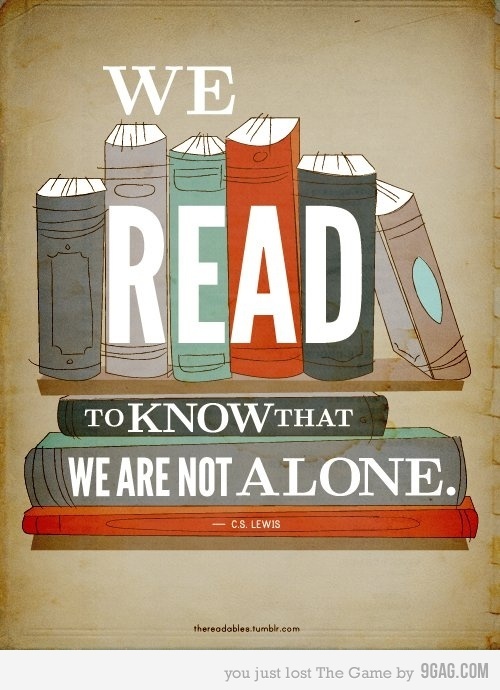
Literary Agent Cameron McClure of the Donald Maas Literary Agency represents LGBT material by authors including me, John Pitts, Brian Francis Slattery and Elizabeth Sims. She says that “in the adult world, selling gay and lesbians hasn’t been an issue for me. I have an urban fantasy series that features a sword wielding lesbian blacksmith, and a few SFF [Science Fiction/Fantasy] novels that have male gay protagonists, and an old lesbian crime series.”
Brown & Smith’s YA novel was a Sci-Fi/Fantasy post-apocalyptic novel, and McClure notes that at least for adults, “the SFF genre is generally more open to this material than mainstream publishing.”
It’s clear that book publishing is not inherently an unfriendly space, but perhaps it’s just as susceptible to market pressures as other forms of media. Ultimately, it would be irresponsible and counterintuitive for an agent to take on a book s/he knew s/he was unable to sell.
As McClure points out: “YA publishers do have legitimate sales reasons for not publishing books with LGBTQ characters. Agents know this, and know that finding a publisher for this material is harder, and the economy sucks, and everyone just wants to eat and be able to buy shit, so sure, there are going to be agents and other “gatekeepers” who don’t want to bother with this material. Because it will be harder to sell and will sell for less money.”
McClure added that this is true for any minority character, not just LGBTQs. As described in How To Make YA Fiction More Diverse, from The Atlantic Monthly: “Conventional wisdom assumes that white kids won’t pick up a book that has a picture of a person of color on the cover, and there have been controversial incidents of YA covers being “whitewashed” in recent years.”
The LGBTQ minority has some specific challenges, too — many libraries/bookstores won’t stock LGBT YA books, and when much of your target audience is hiding their identity from friends & family, it’s hard to pave a direct route to their wallets or nightstands.
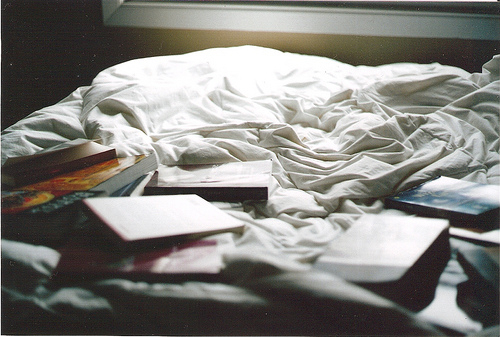
via http://serialcunt.tumblr.com/
Brown & Smith‘s story has now been picked up by tons of LGBT websites as well as The Guardian UK. Needless to say, the story has now made its way to the desk of the unnamed agency in question.
Joanna Stampfel-Volpe works at Nancy Coffey Literary & Media Representation, and says the experience described in the PW piece is “completely untrue... we never asked that the authors change any LGBTQ character to a straight character.” (I recommend you read her entire post explaining what happened, as well as this post from another agent who passed on the manuscript in question for reasons unrelated to sexual orientation.)
She goes on to say:
One of our agents is being used as a springboard for these authors to gain attention for their project. She is being exploited. But even worse, by basing their entire article on untruths, these authors have exploited the topic. By doing that, they’ve chipped away at the validity of the resulting conversation.
And it’s a conversation that should be had.
So let’s continue this conversation, and let’s base it on the truth, which is:
There are not enough mainstream books that depict characters of diverse race, sexual orientation, religious beliefs, and physical and/or mental disabilities.
+
Regardless of veracity, the conversation has indeed begun, and perhaps there’s still time for it to be redirected. Gay teens are more visible on television than ever before, and a large reason for that is how vocal the LGBT community has been about needing that representation. Can we make the same change for LGBT literature? I think we can.
I predict, based on nothing besides my own psychic instincts, we’re going to see the numbers of LGBT-identifying high schoolers skyrocket over the next five years and this is a huge opportunity for the LGBT YA market.
Despite Lo’s conclusion that only 25% of LGBT YA books were about girls, I’ve personally found tracking down lesbian themes in YA fiction relatively easy, and there are several websites dedicated to the genre, including Daisy Porter‘s Queer YA and Lee Wind‘s I’m Here, I’m Queer, What the Hell Do I Read? which was very useful for Laneia and I when we put together our two-part series on lesbian young adult fiction for this website.
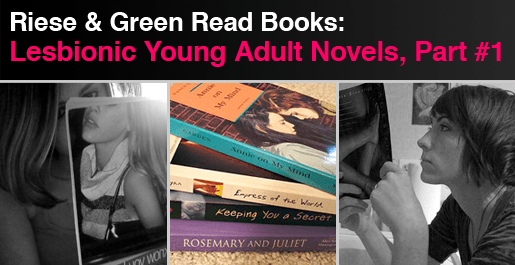
In another reaction piece to the Brown & Smith debacle, gay YA author Scott Tracey suggests:
If you want more books with LGBT content, buy the ones that are already out there. Show publishers that there’s profit to be made by investing in these books.
I’d add to that to seek out especially books with female protagonists or lead characters. Although we’ve done several features on LGBT YA books already, I’m going to make a concerted effort to amp up that coverage on this website, especially YA novels featuring women of color.
So, all you young adults and appreciators of young adult fiction — buy that shit! Brittany/Santana fan-fic is not the only way to get your literary lesbian on. Here’s a starter list:
Young Adult Fiction
+ Annie on My Mind, by Nancy Garden
+ Keeping You a Secret, by Julie Anne Peters
+ Down to the Bone, by Mayra Lazara Dole
+ Gravel Queen, by Tea Benduhn
+ Empress of the World, by Sara Ryan
+ Ash, by Malinda Lo
+ Pages for You: A Novel, by Sylvia Brownrigg
+ Girl Walking Backwards, by Bett Williams
Happy reading!



No worries people!! I am writing one/two!!…assuming my writer’s block will pass @_@…
I think some of the issue is also that so many of the YA books out there with gay people in them are GAY books. As in, GAY is the issue/drama/central concern. Those can be awesome and fun, but it’s also nice to see books about other things (like the current craze for dystopias), that just happen to have a gay character (or even a gay main character).
This, so much. It’d be nice to have a book where the central conflict wasn’t about being gay/ coming out, but that it just so happened that the character was gay. But I don’t see it happening because it would be too hard for agencies to categorize
The Bermudez Triangle (I don’t remember the author) has two best friends fall in love… One comes out as a lesbian, the other ends up identifying as straight, I think. It’s one of the main issues in the book, but there’s definitely other plotlines. It’s pretty good.
Wow, you just provided a perfect plot summary of my freshman year of high school. ;)
That’s by Maureen Johnson, who is hilarious. Mel, the lesbian character, is so adorable I just want to cuddle her. :)
You like Maureen Johnson and you’re on Autostraddle and your Twitter username is Nerdfighter. LET’S BE BEST FRIENDS.
my fav YA gay novel EVER is boy meets boy GO READ IT
actually anything by david levithan
like naomi and eli’s no kiss list (also lgbtq)
basically i love teens novels
i think this is the second post ive made today stating this……awkward.
David Levithan is fantastic. Fact.
I was just going to post about David Levithan! Most, if not all of his books are about gay teens, mainly boys. He also did a collaborative novel with John Green called “Will Grayson Will Grayson” and that’s really great too!
talking about books is so sexy
Will Grayson, Will Grayson by John Green and David Levithan is my favorite LGBTQ young adult novel to date. It was so witty and fun to read. YA is where is at.
Definitely one of my favorite YA books. I approve. :D
I think it has to do a lot with genre, also. The whole time I was reading this, it struck me that the exact opposite is true of creative non-fiction (memoirs, essays, autobiographies, etc.). The rule of thumb there is the less normal you are, the weirder your story, the better. Straight and white doesn’t fly at all, unless you’re hilarious or have had the worst life ever. I don’t know how much of a presence creative nonfiction has in the YA industry, but there you go.
Also, this is why I find myself appreciating television more and more as a means for exposure to LGBTQ narratives. Like, “Glee” and “Pretty Little Liars” are INSANELY popular, and they catch viewers with creative premises and keep their attention with characters they love, some of whom are gay. It shouldn’t have to be, “The plot is so good you’ll barely even notice the gays!” or “Here’s five seconds of Santana and Brittany, now cleanse your palette with some Finn and Rachel making out!” At least it’s a starting point, and I think we’re moving away from it, in a positive way.
how did I break my kindle today I am so sad, it is all the monies and books.
Oh man, I loved Keeping You A Secret. I’ve read a bunch of her books, but Keeping…and “Luna” were my two favorites. I even got my mother to read them…and reread them. Some really great discussions have come out of those YA novels.
I recently read Malinda Lo’s two lesbian YA novels, and really enjoyed them. I’d love to read more of her work.
Oh my! I must hie to a library!
Also that lady in the first picture is adorable…
I did not read the article…
I actually stopped at the part where you talked about a drinking game ( will read the rest tomorrow.its probably really good)
just had this thought that you should do a piece about ‘drinking games’!cause we’re really running out of ideas.
today we played the ‘ I actually don’t wanna drink coz of some lame excuse’ game. the rules are easy:
you don’t want to drink – shot of tequila
you really don’t want to – 2 shots
still don’t want to – 3 shots
starting to want to – another shot
starting to get into it – whiskey sour
totally into it – another one
etc pp
so well, I need new ideas…and a very good hangover cure for tomorrow .
I really support and AS drinking game post. The hairpin had one a few weeks ago and it was great, ergo AS’s would probably be even greater.
I thought that the authors made explicitly clear that they would not say which agent rejected their story on the basis of queerness? So why is that agency so sure it was them? Or did something else happen after that I missed?
Weird, huh? I went back to the article and excerpted this paragraph by the authors:
“We are avoiding names because we don’t want this story to be about one agent who spoke more bluntly than others whose objections were more indirectly expressed. Naming names can make it too easy to target a lone “villain,” who can be blamed and scolded until everyone feels that the matter has been satisfactorily dealt with.”
I respect their larger rationale and their personal ethics on the issue. They acted in good faith and their point is well-taken: the request to “write a gay character out of a story” is a symptom of wider institutionalized homophobia in the media and marketing worlds.
So why did the spokeswoman identify herself and her agency? Was it to set up the accusation that the authors are nefariously “using” her agent as a springboard for their work? If so, that’s just- ick. She’s employing a shift-the-blame, find-a-new-victim rhetorical technique that’s very distasteful.)
After coming out guns a-blazing, she rapidly, and I believe disingenuously, adopts a noble stance of advocacy and opposition to the evils of the system, presenting herself as a champion of truth and change in the industry. Ew. I’ve worked with corporate clients who operate like this, and though I don’t know the woman, her tactics exude a rancid funk.
I know there are two sides to every story, but Ms. Stampfel-Volpe* hardly presents her side in a tone which reassures and inspires confidence.
* Stampfel-Volpe translates almost perfectly to, most unfortunately, “stamping fox” or “stamping bitch.” (the canine version of bitch, of course. I don’t call women bitches.)
God, I LOVE Annie on my Mind. That’s the book that made me know for 200% sure I was gay. It was almost eerie, reading it, because for the longest time I kept struggling with my orientation, and then I read that, and I was like “HOLY SH*T this book was made for me and there is no longer any question that I am a flaming rainbow unicorn.”
Also, I like that the characters are down-to-earth nice girls and not full of all the snarky crap they like to have in “edgy” characters and fiction nowadays. To me, at least, it seems like some of the more modern lgtb fiction tries to equate “gay” with “drug-addicted Goth cutter who swears a lot.” Maybe I’m just reading the wrong stuff.
Though Malinda Lo’s Ash was pretty cool. Malinda Lo just seems like an all-around awesome person.
This is so relevant to my interests.
I’m actually trying to get a book published, and feeling as I’m querying it out that I have to either represent it as a genre book, and gloss over the gayness, or ignore the genre entirely and brand it as a Gay Book.
I will say that it’s so hard to make a case that a book will have a solid audience when it’s limited to a “special interest” – I’m trying to just write the kind of books I want to read, but playing the agent game is Hard.
Thanks for linking both sides of the story!
Good luck!
I’m trying to publish something too, but I’ll probably wind up putting the whole thing online for free or something.
Also? Thank you for posting your drinking game!
The Trouble with Emily Dickinson is my favorite lesbian YA novel. It’s both kind of terrible, but awesome. I had a giant crush on the main character.
“Keeping You a Secret” stayed with me for a long time. It was fantastic.
The shirts… Oh the shirts.
I didn’t read all the GG books, but I’m pretty sure Chuck Bass was actually bisexual. There were time when he showed some pretty clear interest in the opposite sex.
Yeah, Chuck was bi in the books(2/3 of the All Male Dutch Snowboarding team!) and Dan had a “gay phase.” In defense-ish of the show, most of the characters and storylines changed really drastically in transition from book to TV show. While they did cop out a bit by not making Chuck gay, the show did make Eric gay and have given his romantic storylines a decent amount of airtime over the past few years.
I really enjoyed all the autostraddle articles on YA novels so far.
But since my highschool days have been over for a while I was wondering if there are any books about college age lesbians?
For example I just read “The IHOP Papers” wich still deals with the coming of age process but for girls who are a little older.
Any suggestions or maybe a topic for another article?
I’m convinced one of the unmentioned culprits in the “unqueering” of YA fiction is Scholastic Inc. Scholastic has a profound impact on publishers since they’re able to sell books directly in schools (since they’re pretty much bribed schools to do so and have a monopoly on it) and exert pressure as to which books will and will not be marketed that way. Scholastic has had several incidences of censoring books and demanding a rewritten version be done before the books can be marketed in their on-site sales. An example was the Middle School book “Luv Ya Bunches” (http://www.proudparenting.com/node/14699). I’d also like to note that Scholastic Inc. has a very low HRC Corporate Equality Score (barely above that of Walmart) for a company headquartered in NYC.
There is incredible queer/trans themed YA Fiction out there and the best place to learn about it is this woman’s blog: http://daisyporter.org/queerya/. She does a great job covering new titles.
O M G, Riese, the drinking game is hilarious! I need to make one about high school tests.
Just wanted to recommend another great new queer YA novel. It’s called “Sister Mischief,” by Laura Goode and it’s a queer multicultural hiphop high school romance. What more can you ask for? :)
(Disclaimer: Laura is an old classmate of mine, and a friend. But if you want a bit more objectivity, check out the stellar reviews this book has been getting.)
I work at a major chain bookstore in the UK and, with my manager’s support, created a very visible display of LGBT YA books. There’s no doubting what they are, there’s even a big ol’ rainbow on the display. No-one has complained, the books have sold better than other displays in that area and there’s been a lot of positive feedback. IN FACT the display grew out of the YA novels mentioned in the AS article. The ones I could get a hold of over here anyway. I desperately wanted to include Truth Dare Promise but I couldn’t order it in :(
Keeping You a Secret has sold really well. It’s a lovely book.
Guys… I have a confession… The reason I haven’t read any Gay YA is because I feel like it’s all gonna be very teenieweenie books. I KNOW it’s not true and they’re probably very well-written with intriguing themes and voice and stuff that induces deep thinking, but for some reason I just assume it’s gonna be a gay “Angus, Thongs and Perfect Snogging” (which I haven’t read, but I know it’s basic plot)
I am fully guilty of judging a book by its cover and you guys should kick the crap out of me and tell me which gaymo book to start with.
Well teen books are teen books and there is a bit of a preoccupation with, you know, sex and relationships and high school and usually a coming-out narrative, because that’s often what teenagers are preoccupied with. but try Will Grayson, Will Grayson, by John Green and David Levithan and Annie On My Mind by Nancy Garden (classic for a reason IMO).
I think the most important thing to mention here is just how much ‘Annie on My Mind’ sucks.
I really liked Hello Groin by Beth Goobie.
Also, the cover of that book “set off my gaydar” even though the summary didn’t say anything about it… which I think is pretty hilarious.
I read the defense by the agency and could only laugh. The defense basically states they wanted the gay character’s pov cut but it certainly had nothing to do with the character being gay. What a crock. This post even brings up that only 1% of YA literature is GLBT and defends that with the ridiculous assertion that probably only 1% of teens identify as LGBT. Do you mean publically or privately?
It could be worse. Movies and television degay characters at an alarming rate or give us the infamous bi female of tv (in other words they sleep with women only during ratings time). Frankly, this article sounds like someone defending the field they once worked in and not taking a serious look at the issue. Riese, I expect better.
In other news, I really like Sherwood Smith and she has a lot of kick ass female characters and they made me happy growing up even though they mostly wanted to kiss boys.
I would like to quietly recommend “Will Grayson, Will Grayson”. Just saying.
THANK YOU FOR WRITING AN ARTICLE ABOUT THIS this shit is the story of my life
i have spent countless hours combing the bookshelves in bookstores and libraries for ANY books with ANY queer characters. annie on my mind and keeping you a secret have been my bibles since i was thirteen and secretly read them at night when no one could see what i was reading. askdjfldskj thanks
ME TOO. then i went to college and discovered michelle tea and my life changed.
wow these books are now on my list… I’ve been looking forever to find books with lgbtq characters.
How strange to find out Ash is lesbian themed, I bought it in a charity shop because I liked the cover and it sounded interesting (don’t recall the blurb mentioning the lesbian-ness though) and it’s now on my pile of books to read :)
I am not sure how the authors are trying to publicity grab when they specifically did not identify the agency in their initial post.
Pingback: Soft Revolution » Blog Archive » Grassroots Internet Revolution
Pingback: Are Literary Agents And Publishers Homophobic?
Also the Bermudez Triangle by Maureen Johnson! I can’t reccomend this one enough! http://www.maureenjohnsonbooks.com/books/the-bermudez-triangle/
I am such an avid reader, and I find myself trapped in a world of books filled with sub-par gay content. Or, for the most part, none at all! I am constantly searching bookstores and the internet to find really good, authentic lesbian novels like the ones I grew up with (Annie on My Mind, Keeping You a Secret, etc.)I feel like our society usually “straightens” the lesbian characters out, and nothing I have read lately has really seemed realistic to me.
Has anyone read Lunatic Fringe by Allison Moon? I just ordered it, and it looks promising! I am still trying to wrap my head around lesbian werewolf sex, but I will try anything once! ;)
but the thing isnt even really that theres no books with gay characters thats not it
i just want to have fantasy books where the romantic interest happens to have the same gender
its NOT THAT BIG OF AN ISSUE its not like straight relationships are that different from homosexual ones if its written well most people could still relate
or just a character that likes boys and girls its not that unusual i mean this is young adult stories the people in there aren’t all grown up and sure about their sexual orientation anyway, it’s unrealistic for them to be entirely uninterested in their own gender
grrrr this really annoys me. I don’t want ‘lesbian’ and ‘gay’ novels I just want realistic real life characters that happen to not be straight and its not the main issue of their lives
Pingback: Are Literary Agents And Publishers Homophobic? - Asian and Pacific Islander Family Pride